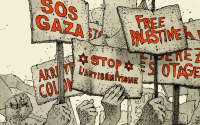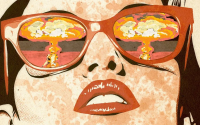September 23, 2002The Guardian
An unforeseen threat to freedom of speech in British broadcasting emerged last week. It was triggered by the showing of my documentary, Palestine is Still the Issue, on ITV. The film told a basic truth that is routinely relegated, even suppressed - that a historic injustice has been done to the Palestinian people, and until Israel's illegal and brutal occupation ends, there will be no peace for anyone, Israelis included.
Most of the film allowed people to tell their eyewitness stories, both Palestinians and Israelis. What was unusual was that it disclosed in detail the daily humiliation and cultural denigration of the Palestinians, including a sequence showing excrement smeared by Israeli soldiers in a room of children's paintings. The film was accurate, restrained and fair; the longest interview was with an Israeli government spokesman. Every word and frame was subjected to a legal examination for accuracy and to ensure it complied with the fairness regulations in the Broadcasting Act.
Our historical adviser, Professor Ilan Pappé, the distinguished Israeli historian. He wrote to Carlton Television that "the film is faultless in its historical description and poignant in its message". None of this deterred the chairman of Carlton, Michael Green, a supporter of Israel's policies, from abusing the programme makers in the Jewish Chronicle, calling the film "inaccurate", "historically incorrect" and "a tragedy for Israel".
Not one of his accusations was, or can be, substantiated. Professor Pappé called the attack "an attempt to delegitimise any criticism of Israel". This was followed by an unprecedented rebuke of its chairman by Carlton's Factual Department, which stood by the film's accuracy.
What is disquieting is that Green had actually seen the film before it went to air, and had not alerted the programme makers to his concerns, waiting until the Jewish Board of Deputies, the Conservative Friends of Israel and the Israeli embassy expressed their "outrage" at a film transmitted after most people were in bed.
A "pro-Israel" film is now being demanded by them and Green. What does this mean? My film was pro-Palestinian in as much as it was pro-justice. Most of those interviewed were patriotic Israelis, including the war veteran father of a teenage girl killed in a suicide bombing. He and others put the lie to the standard Zionist cry that any criticism of Israel is anti-semitic, a claim that insults all those Jewish people who reject the likes of Ariel Sharon acting in their name.
So what does "balance" mean? A film approved by the Israel lobby? This lobby is currently orchestrating an email campaign against my film; curiously, many of the emails are coming from America, where it has not been shown.
At the heart of this is a failure to acknowledge the overwhelming imbalance in the British media in favour of the Israeli point of view. ITV deserves great credit for funding and broadcasting my film, which sought to redress a little of this. The BBC would have never dared to incur the wrath of one of the most influential lobbies in this country, as Tim Llewellyn, the BBC's Middle East correspondent for many years, says in a letter in today's Guardian. He accuses the BBC of "continuing to duck" its public service duty to explain "the true nature of the disaster [of the occupation] and Israel's overwhelming responsibility for it".
This general bias is verified by a remarkable study of the television coverage of the Middle East, conducted last May by the Glasgow University Media Group. The conclusions ought to shame broadcasters. The research shows that the public's lack of understanding of the conflicts and its origins is actually compounded by the "coverage". Viewers are rarely told that the Palestinians are victims of an illegal military occupation. The term "occupied territories" is rarely explained. Only 9% of young people interviewed know that the Israelis are both the occupiers and the illegal "settlers".
The selective use of language is striking, says the study. Words such as "murder", "atrocity" and "terrorism" are used almost exclusively in relation to Israeli deaths. The extent to which broadcasters assume the Israeli perspective, says Professor Greg Philo, "can be seen if the statements are reversed ... We did not find any [news] reports stating that 'The Palestinian attacks were in retaliation for the murder of those resisting the illegal Israeli occupation.'"
For years, journalists have complained about Zionist hate mail and the pressure of the "regular call from the Israeli embassy" to current affairs editors. This can take a subtle form: pressure is applied to correspondents in Jerusalem, who then shape their reports accordingly in the interests of what they tell themselves is "balance", but is, in effect, censorship by omission. The system gets the Israelis off their backs and "makes life bearable".
If Michael Green and his vociferous friends succeed in intimidating ITV and the Independent Television Commission, the freedom of broadcasters to be more than mere channellers of "official truth" and to offer viewers suppressed facts and a true diversity of perspective, will be destroyed. No matter how big and powerful the corporate media, journalists and broadcasters have a duty to resist on behalf of the public we are meant to serve.






